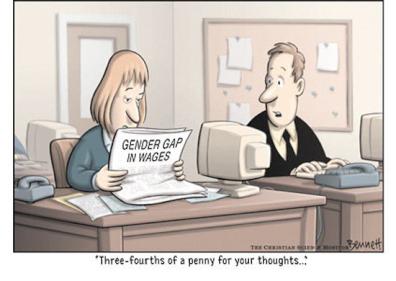| Written by Deborah Kolb, Judith Williams, and Carol Frohlinger |
| Tuesday, 14 April 2009 20:22 |
Women are winning the numbers game in the workforce. They now fill almost half of the country’s managerial jobs. In 1999, about 60% of females, 16 years of age or older, worked outside the home, up from 20% at the turn of the century.  Source: Business Week  Source: US Department of Labor  Source: US Department of Labor Given the data, it’s surprising to discover that by a good margin most female managers think they have reached wage parity with their male colleagues. The statistics are sobering: 70% of female executives think they’re paid as much as males; 78% of men agree. The facts, however, show that women in management take home only 62.7% of what male managers earn (Source: Gallup, American Management Association). Realities and Myths Behind the Persistent Wage GapLike all entrenched patterns, the gender gap in wages is supported by both myth and reality. Some of the realities behind the differential require policy changes at the highest levels.
The Cumulative PriceContrary to folk wisdom, women are just as likely as men are to negotiate compensation. The problem is, they don’t realize the same results from their efforts. When men negotiate an entry salary or a raise, they achieve on average a 4.3% increase from the initial figure. By contrast, when women negotiate, they realize only 2.7% more. This gap adds up.Over the span of a career, the lag translates into about a 35% wage differential that can be traced back to starting salaries. According to a recent study, if current wage patterns continue, a 25-year-old woman, who works full time, will earn $523,000 less than the average 25-year-old man will by the time they both retire at 65. That’s a lot of money. But the discrepancy affects more than a bank account or financial security. Salaries are important. They are a good index of the value an organization puts on your skills and contributions. In turn, they shape an individual’s notion of self-worth. Narrowing the GapWhat can an individual woman do when she bumps up against the wage gap? Plenty.
|
welcome
Rabu, 07 Juli 2010
Confronting the Gender Gap in Wages
Label:
careers,
gap,
gender,
Indonesia Vacancy,
Jobs Indonesia,
pay,
wages
Langganan:
Posting Komentar (Atom)
Label
careers
(218)
Jobs Indonesia
(211)
Indonesia Vacancy
(209)
woman
(75)
moms
(32)
business
(28)
mother
(17)
work
(14)
man
(11)
tips
(11)
Success
(10)
fashion
(8)
mom
(8)
beauty
(7)
child
(5)
interview
(5)
stress
(5)
teen
(5)
gender
(4)
home
(4)
pengetahuan
(4)
pregnant
(4)
single mother
(4)
workplace
(4)
beautiful
(3)
biography
(3)
health
(3)
internet
(3)
leadership
(3)
makeup
(3)
manage
(3)
office
(3)
pay
(3)
Professional Woman
(2)
busana
(2)
dress
(2)
employee
(2)
family
(2)
fitness
(2)
fun
(2)
gap
(2)
hobby
(2)
husbands
(2)
jobs
(2)
kids
(2)
love
(2)
men
(2)
money
(2)
nanny
(2)
nurses
(2)
personality
(2)
planning
(2)
relationship
(2)
salary
(2)
stay at home
(2)
stereotype
(2)
story
(2)
wife
(2)
women
(2)
work at home
(2)
Communication
(1)
Criticism
(1)
Indonesia Vacancy
(1)
Indonesia Vacancy Bookmark and Share
(1)
Motivation
(1)
Powerful
(1)
advantage
(1)
best job
(1)
boys' club
(1)
busy
(1)
buzy
(1)
calculate
(1)
career tips
(1)
change
(1)
companies
(1)
confidence
(1)
conflict
(1)
cry
(1)
dad
(1)
doctor
(1)
enjoy
(1)
female
(1)
female bosses
(1)
financial
(1)
franchises
(1)
funky
(1)
girl
(1)
hair
(1)
happy
(1)
hire
(1)
imagination
(1)
lawyer
(1)
listen
(1)
look
(1)
looking
(1)
managing
(1)
market
(1)
marketing
(1)
marriage
(1)
married
(1)
medical
(1)
midwife
(1)
military
(1)
mindset
(1)
mothers
(1)
negotiation
(1)
nose
(1)
online
(1)
organize
(1)
parenting
(1)
play
(1)
poem
(1)
problem
(1)
professional
(1)
promote
(1)
resume
(1)
rule
(1)
secret
(1)
secretaries
(1)
sexy
(1)
skin
(1)
start career
(1)
succes
(1)
summer
(1)
superwoman
(1)
teacher
(1)
vacation
(1)
wages
(1)
war
(1)
work day
(1)

Tidak ada komentar:
Posting Komentar